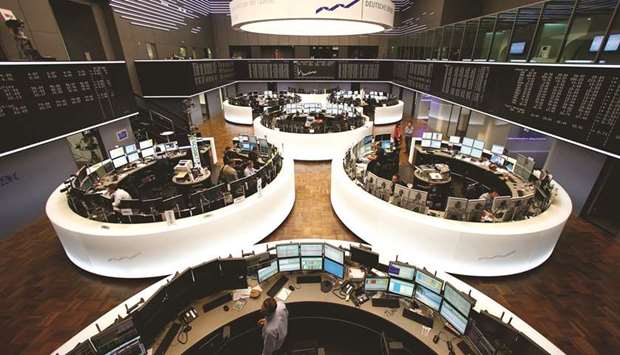In a record-breaking month that added $1.7tn to European equities, none rallied as hard as unloved bargain stocks.
The Stoxx Europe 600 Index has surged 15% in November, on track to overtake the previous record set in April 2009 in the aftermath of the global financial crisis. Now, like then, value and cyclical sectors such as banks, insurance and autos shares are driving the rally. This time, oil stocks have also joined the party.
As progress on coronavirus vaccines fuels hopes of a return to normalcy, and Joe Biden’s US election win reduces political uncertainty, industries and regional markets that suffered the most during the pandemic have led gains this month. Nine of the 10 best stock markets among 93 benchmarks tracked by Bloomberg are European, with gauges for Greece, Spain and Italy rallying more than 20%. All of them have a heavy weighting of financial shares.
“The equity market rotation following the vaccine announcement has been very significant,” according to Amundi SA head of equity Kasper Elmgreen, who says a clearer path to normalisation has allowed markets to discount uncertainty in coming quarters. “It marks a sharp reversal of the momentum and growth leadership towards cyclical and value.”
That should benefit Europe, whose heavy weighting of value shares has previously hampered its chance of outperformance against global peers. The Stoxx 600’s November rally, which has added $1.7tn to the market value of its members, is particularly impressive, given it has posted monthly gains exceeding 10% only four times in the past 20 years.
Strategists say the trend favouring long-time laggards is far from done. Goldman Sachs Group Inc, JPMorgan Chase & Co, Barclays Plc, Citigroup Inc, Credit Suisse Group AG, Bank of America Corp and BNP Paribas SA all expect more outperformance from value stocks in the coming months.
Industries hurt disproportionately by the pandemic, such as airlines and other travel stocks, are surging on bets of a return to normalcy next year, while the expected rebound in activity – and the potential return of dividend payments – is boosting banks.
Mall owners are also back in investors’ good books, with Unibail-Rodamco-Westfield and Klepierre SA up 81% and 78% respectively this month to beat all other members of the Stoxx 600. Their performances also hint at short covering, with both stocks still having a short interest of about 20% of their free float, according to IHS Markit data. British Airways owner IAG SA is up 67%.
Style-wise, the value trade is challenging momentum stocks in particular. Analysing gauges of long and short positions on the two trades suggests the trend that dominated the market for five months has completely reversed in the space of four weeks.
“The combination of sharp economic growth improvement and the extended valuation differential between growth and value should support a rotation into value,” said Goldman Sachs strategist Sharon Bell, who has an overweight stance on sectors including energy, banks, autos, basic resources and construction. On the flip side, stocks that benefited under lockdowns are under pressure. Among the worst Stoxx 600 performers this month are food-delivery company Just Eat Takeaway.com NV and Games Workshop Group Plc, down about 7.6% each. Online grocer Ocado Group Plc is down 2.6%.
Diagnostic-testing and lab-equipment stocks like BioMerieux, DiaSorin SpA and Sartorius Stedim Biotech, which have benefited from demand for Covid-19 tests, have also underperformed.
Still, given that several major economies are currently struggling with lockdowns and rising coronavirus cases, the selloff hasn’t been strong among such shares. And some investors are betting the shifts in society will be long-lasting.
The pandemic has wrought permanent change in many areas such as commerce, payments, cloud computing and operate-from-anywhere solutions, said Thomas Fitzgerald, a fund manager at EdenTree Investment Management Ltd. It’s a trend he sees carrying on well after the crisis ends.
Volatility Crusher
The biggest loser, in fact, has been volatility. The VStoxx Index of euro-area swings had begun its descent ahead of the US presidential election, and the slide accelerated following Biden’s win and the wave of positive vaccine news. The gauge hit its lowest level since February 21 and is almost back to levels seen before the outbreak.
That’s one gauge to keep an eye on, especially as JPMorgan strategists anticipate a $300bn rebalancing flow from equities by year-end.
Longer term, it’s crucial that expectations are met about the effectiveness of the Covid-19 vaccine and its rapid distribution, along with broad coverage by the end of the third quarter of 2021, according to DWS Group GmbH chief investment officer Stefan Kreuzkamp. “Markets have this optimistic scenario already priced in and there is no big room for any margin of error,” he said.

Traders monitor data on computer screens at the Frankfurt Stock Exchange (file). The Stoxx Europe 600 Index has surged 15% in November, on track to overtake the previous record set in April 2009 in the aftermath of the global financial crisis.
